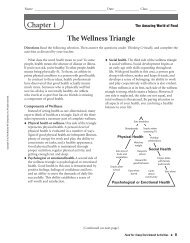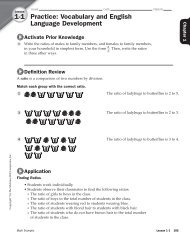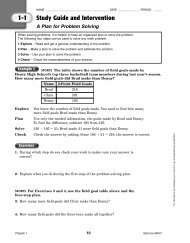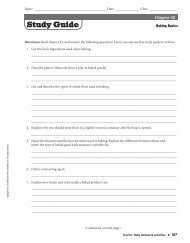Chapter 13: Mollusks, Worms, Arthropods, Echinoderms
Chapter 13: Mollusks, Worms, Arthropods, Echinoderms
Chapter 13: Mollusks, Worms, Arthropods, Echinoderms
You also want an ePaper? Increase the reach of your titles
YUMPU automatically turns print PDFs into web optimized ePapers that Google loves.
Topic: Beneficial Leeches<br />
Visit life.msscience.com for Web<br />
links to information about the uses<br />
of chemicals from leech saliva.<br />
Activity Describe a possible<br />
use for leech saliva, and design a<br />
30-second commercial on how<br />
you might sell it.<br />
Figure 12 Medical leeches<br />
are used sometimes to prevent<br />
blood from clotting or accumulating<br />
in damaged skin.<br />
Explain how a leech can prevent<br />
blood clots.<br />
368 CHAPTER <strong>13</strong> <strong>Mollusks</strong>, <strong>Worms</strong>, <strong>Arthropods</strong>, <strong>Echinoderms</strong><br />
St. Bartholomew's Hospital/Science Photo Library/Photo Researchers<br />
Leeches<br />
A favorite topic for scary movies is leeches. If you’ve ever had<br />
to remove a leech from your body after swimming in a freshwater<br />
pond, lake, or river, you know it isn’t fun. Leeches are segmented<br />
worms, but their bodies are not as round or as long as<br />
earthworms are, and they don’t have setae. They feed on the<br />
blood of other animals. A sucker at each end of a leech’s body is<br />
used to attach itself to an animal. If a leech attaches to you, you<br />
probably won’t feel it. Leeches produce many chemicals, including<br />
an anesthetic (a nus THEH tihk) that numbs the wound so<br />
you don’t feel its bite. After the leech has attached itself, it cuts<br />
into the animal and sucks out two to ten times its own weight in<br />
blood. Even though leeches prefer to eat blood, they can survive<br />
by eating aquatic insects and other organisms instead.<br />
Why is producing an anesthetic an advantage to<br />
a leech?<br />
Leeches and Medicine<br />
Sometimes, leeches are used after surgery to keep blood<br />
flowing to the repaired area, as shown in Figure 12. For example,<br />
the tiny blood vessels in the ear quickly can become blocked<br />
with blood clots after surgery. To keep blood flowing in such<br />
places, physicians might attach leeches to the surgical site. As the<br />
leeches feed on the blood, chemicals in their saliva prevent the<br />
blood from coagulating. Besides the anti-clotting chemical,<br />
leech saliva also contains a chemical that dilates blood vessels,<br />
which improves the blood flow and allows the wound to heal<br />
more quickly. These chemicals are being studied to treat patients<br />
with heart or circulatory diseases, strokes, arthritis, or glaucoma.

















